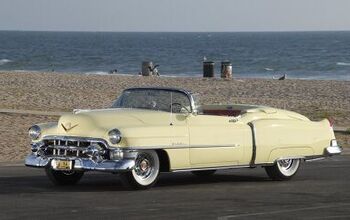Bank Study Claims 52 Percent of Households Postponed New Vehicle Purchases

A survey conducted by Santander Holdings USA, attempting to probe the status of middle-class households over the last twelve months, has reported that over half are actively delaying new-vehicle purchases. While the study is broad in scope, encompassing some similarly bleak news about home buying, the two issues seem closely related as rising costs don’t appear to be doing the economy any favors.
With 77 percent of the middle-class respondents saying they need a vehicle in order to get to work, one would assume that the demographic is one the automotive sector can rely on for business. However, 52 percent of the households Santander questioned stated that they have delayed purchasing a new vehicle within the past year due to cost. But the cost isn’t limited to rising car prices and swollen interest rates.
While we’re focused entirely on automotive issues, home ownership has indeed played a factor in reducing vehicle purchases. Due to the fact that fewer Americans can afford to buy property these days, many households are ultimately putting more of their monthly budget toward lodging.
Buying a house costs more upfront and incurs property taxes. But owners tend to find themselves in a much better financial position over time, especially once the property is paid off. Renters never own the places they live and are subject to shifting rates. This is particularly interesting because renters tend to earn less than their home-buying equivalents. Ironically, having less money now often means spending more money later.
Regardless of the why, more people renting means more income going toward landlords and apartment management companies. But less of that cash is making its way to dealerships and automakers. Santander framed the result of its study as younger generations believing that “homeownership as a sign of financial prosperity is an outdated concept.” The idea here is that renting offers greater flexibility to pursue other opportunities and no requirements in terms of maintaining the residence. However, a majority of respondents also said they wanted more affordable housing options and more homes built to reduce prices — suggesting that the real issue is likely affordability and not a sudden love affair with apartment buildings.
At the end of the day, most people are going to choose to prioritize having a place to live and something to eat over buying something new to drive. But there are certainly situations, especially for middle-class individuals, where one item often necessitates the other. Cars can simply be made to last a little longer, a trend that’s reflected by the ever-increasing age of the vehicles we’re seeing on the road.
They cannot last indefinitely, however, and the survey shows that about 40 percent of the middle-class households it questioned still wanted to purchase a new vehicle within the next year. Santander suggested that the matter likely hinged on lower prices and interest rates. Inflation was similarly a major worry, with 81 percent of respondents saying it was of significant concern and 55 percent saying it was the biggest financial obstacle they were presently confronting. The overwhelming majority of respondents likewise saw prices as increasing over the last quarter and assumed they’d continue to scale back spending as a result.
Nearly 90 percent of households said they were forced to reduce spending within the last quarter, with many likewise confirming that they had dipped into their savings to remain afloat. But those that had exhausted their savings were forced to take on new debt, further limiting their spending choices. We probably didn’t need a bank to tell us any of the above, especially if you happen to be living on any kind of budget. But it does offer additional data points and helps underscore some of the reasons why dealers aren’t terribly optimistic about vehicle sales moving forward.
That said, some of the data actually seems to show that some families have pivoted toward survival mode. Despite a large number of households (52 percent) stating that they had put off buying a new vehicle over the last twelve months, fewer than that said they’d be more willing to entertain making that purchase if financing rates or vehicle pricing declined. That would seem to indicate that their financial decision is based on additional factors. Only about 40 percent of the respondents were even considering buying another vehicle within the next 12 months, suggesting that about 12 percent of the individuals that wanted to buy a new car this year may not even bother trying next year.
Interested parties wanting to get a closer look at the survey’s methodology or results (it's an easy read) can find them here. While the paper attempts to put a positive spin on lapsing home ownership and the declining purchasing power of younger generations, the gist remains that the financial situation for Americans is shaping up to be fairly bleak. Considering how automakers have positioned their lineups and financial institutions have pegged interest rates, we’re not exactly sure when this will turn around. But it doesn’t appear as if it will be anytime soon.
[Images: Gretchen Gunda Enger/Shutterstock; Santander]
Become a TTAC insider. Get the latest news, features, TTAC takes, and everything else that gets to the truth about cars first by subscribing to our newsletter.

Consumer advocate tracking industry trends and regulations. Before joining TTAC, Matt spent a decade working for marketing and research firms based in NYC. Clients included several of the world’s largest automakers, global tire brands, and aftermarket part suppliers. Dissatisfied, he pivoted to writing about cars. Since then, he has become an ardent supporter of the right-to-repair movement, been interviewed about the automotive sector by national broadcasts, participated in a few amateur rallying events, and driven more rental cars than anyone ever should. Handy with a wrench, Matt grew up surrounded by Detroit auto workers and learned to drive by twelve. A contrarian, Matt claims to prefer understeer and motorcycles.
More by Matt Posky
Latest Car Reviews
Read moreLatest Product Reviews
Read moreRecent Comments
- The Oracle Won’t be in the market for a good bit myself, but I am liking the turbo I6 offerings lately. The 3.0 T6 in my long-retired company 2012 XC60R finally burnt a valve at 280K and I have a 100K motor/trans going back in for $1300 and a lot of sporadic self performed labor. Been a good vehicle, worth a service life extension.
- MaintenanceCosts Frustrated seller hit his limit with Italian mechanical tomfoolery, lowballed himself. Hopefully he rethinks, because even with all those miles this is worth a lot more than $3k.
- Fred If real, this car is probably sold or soon will be. Clean out the fuel, diagnosis the electrical, fix what you want and enjoy or flip onto BAT for $30,000.
- Zerofoo Europe destroys itself every 100 years or so. The next time they do - we should not save them.
- Jbltg Nooooooooooooooooooooooooo!!!






































Comments
Join the conversation
Won’t be in the market for a good bit myself, but I am liking the turbo I6 offerings lately. The 3.0 T6 in my long-retired company 2012 XC60R finally burnt a valve at 280K and I have a 100K motor/trans going back in for $1300 and a lot of sporadic self performed labor. Been a good vehicle, worth a service life extension.
I am in the lower end of ladder of income ($50,000 a year with OT) I do have a house I bought just before the spike and I stayed within my budget. I was going to buy a new car as my 07 PT Cruiser with 240K is on its last legs. But the home insurance and taxes has doubled my house payment in seven years. Now I am looking for a used car. I could afford a new car in 07. I make more money, not much more after inflation adjustement, but darn I really was looking forward to a new car. I guess better to sleep in house at night then a car